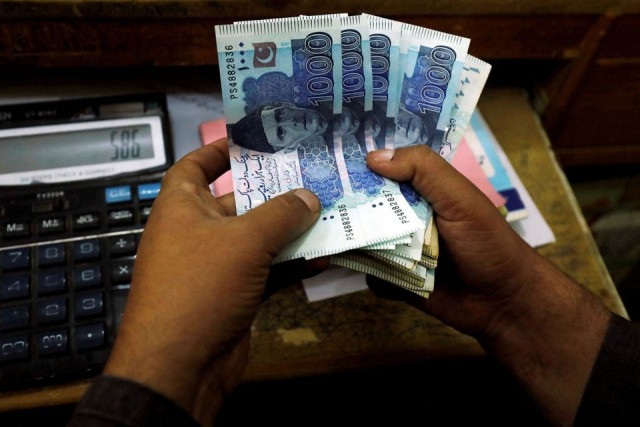Non-FBR personnel collect Rs734 billion in taxes
Withholding taxes made up nearly 66% of total tax collection in current fiscal year

Withholding agents, who are mostly private persons, have become bigger tax collectors than privileged taxmen, and have pooled Rs734 billion or two-thirds of the total income tax during the first five months of the current fiscal year.
The maximum amount of income tax collected was from the contractors, consultants, importers, saving account holders, salaried persons and the industrial and commercial electricity consumers, showed details compiled by the Federal Board of Revenue (FBR).
Of Rs1.1 trillion that the FBR collected, on account of income tax during the July-November period, Rs734 billion were collected by those who are not employees of the FBR. The amount paid as advance income tax by taxpayers is over and above this collection.
There was also a surprising increase of 3,100% in income tax collection on outbound money transactions conducted through debit and credit cards. The government charges up to 2% tax if an overseas purchase is made through plastic cards.
This fresh piece of information emerged amid serious challenges being faced by the FBR in achieving December’s tax collection target of Rs965 billion. On Tuesday, collection barely crossed the Rs500 billion mark with only three working days left in the month – leaving another Rs460 billion still to be collected to achieve the monthly target. Banks are now being forced to keep their branches open, post working hours, to compensate for the inefficiency of the FBR.
According to details, the phenomenal increase in income tax rates in the budget has turned out to be the main reason behind an over 40% increase in tax collection during the July-November 2022 period.
From July through November of fiscal year 2022-23, the FBR collected Rs734 billion in withholding taxes (WHT). Their share in the total direct tax collection was nearly 66% in the current fiscal year. Overall, WHT collection increased 35% or Rs192 billion in the first five months of the fiscal year, despite the FBR withdrawing many WHT related clauses.
Under a World Bank loan condition, Pakistan has committed to gradually reducing reliance on WHT – as these taxes are pooled in by the people and departments who are not FBR employees. The FBR does not compensate them.
A majority of the withholding agents are private organisations or the provincial excise and taxation departments.
The FBR has been given an annual tax collection target of Rs7.470 trillion for the current fiscal year. But results of the first (almost) six months, suggest that the collector will miss the target by a wide margin.
This month, Finance Minister Ishaq Dar directed the FBR to increase tax collection through enforcement measures, as he did not approve a plan to impose more taxes at this stage. However, the shortfall in December may compel the government to review its strategy.
The FBR's tax collection from salaried persons jumped 41% to Rs92.3 billion. There was an increase of Rs27 billion in tax payments by salaried persons amid double-digit inflation. The Pakistan Muslim League-Nawaz (PML-N) led coalition government has increased income tax rates for the salaried class, but waived taxes for traders.
Tax collection from contractors and service providers jumped by 30% to Rs138 billion in the first five months – an increase of Rs32 billion. While this is the single largest income tax collection head – the FBR does not have any role in it.
Importers paid Rs123.5 billion in income tax on various types of imports – recording a surge of 8% despite the imports contracting one-fifth.
The collection of WHTs on phone services went up by 54% to nearly Rs36 billion, surging by Rs12.5 billion. The government charges up to 20% income tax from telephone, internet and mobile users, but the FBR does not collect these taxes directly.
The collection of WHT on dividend income decreased by 3% to Rs35 billion after the government withdrew tax from a class of the elite club in the budget.
The collection on account of profit on debt jumped by 112% to Rs116 billion in five months. The increase suggests the impact of higher interest rates and people’s tendency to save money. Banks charge 10% to 50% income tax rates on these saving accounts on behalf of the FBR – without any monetary benefit.
The WHT collection on purchase and transfer of property increased by 38% to Rs31 billion, following the FBR’s decision to increase the rates to 7% of the value of the property.
Collection on the sale of immovable properties went up by 319% to Rs24.5 billion. This suggests that the impact of upward revising the value of properties and increased number of transactions.
Another Rs14 billion were collected on rental property income – up by Rs2 billion or 17%.
Exporters also paid Rs29 billion in income tax – up by 30%. Commercial and industrial electricity consumers paid Rs43.5 billion in income tax, up by two-thirds, after the government increased electricity tariffs significantly.
Various banks collected Rs1.3 billion on the credit and debit cards to make overseas transactions – up by 3100%. This month, the central bank imposed fresh restrictions on the outward flow of dollars and their purchase from the local market in addition to limiting the use of debit and credit cards.
State Bank Pakistan Governor Jameel Ahmad stated that credit card transactions had reached $1.4 billion, which after fresh measures, would come down by $500 million.



















COMMENTS
Comments are moderated and generally will be posted if they are on-topic and not abusive.
For more information, please see our Comments FAQ